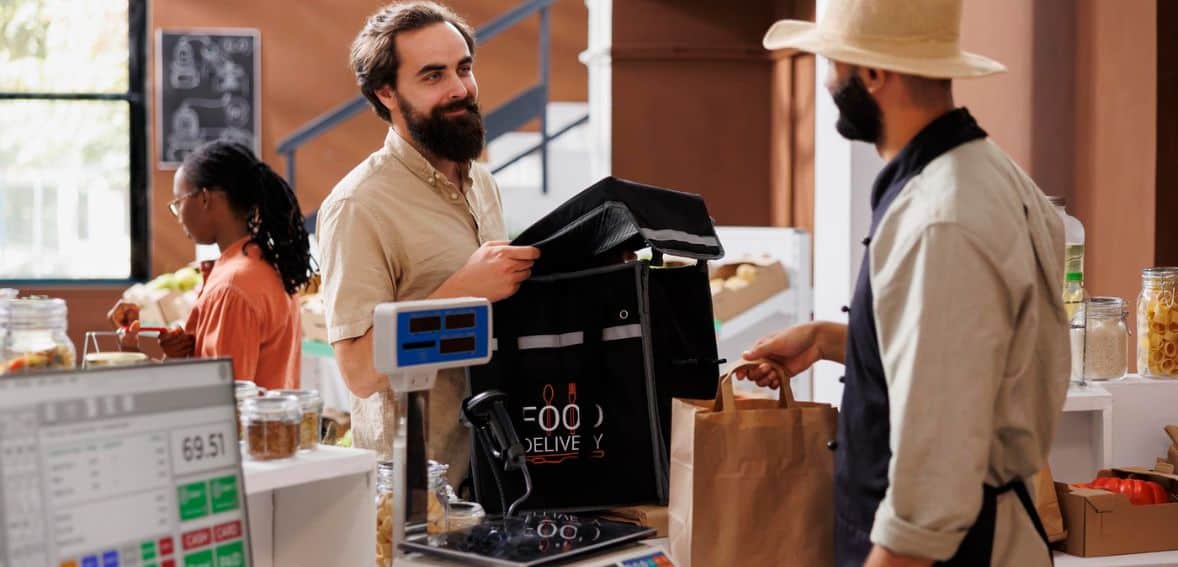
By alphacardprocess September 14, 2025
Technology has always presented both opportunities and challenges for small businesses. Innovation can lead to improved customer experiences and more efficient operations, on the one hand. However, implementing new systems can be costly and overwhelming. This tension is particularly severe in the payments industry. Large terminals, exorbitant prices, or restricted payment options are problems for many small businesses.
For this reason, the emergence of SoftPOS, which stands for Software Point of Sale, is such a revolutionary development. Businesses can now accept payments directly on a smartphone or tablet without the need for specialized hardware. This innovation has the potential to eliminate obstacles, reduce expenses, and revolutionize the way small businesses communicate with their clients in real-time.
The Traditional Challenges of Payment Acceptance

In the past, small businesses were forced to accept card payments using countertop machines or payment terminals. For a small business or independent vendor, these devices frequently came with costly monthly fees, rigid contracts, or technical hassles that weren’t always worth it.
Cash-only transactions were the default for many merchants, which limited sales opportunities and irritated customers. Furthermore, terminals were rarely portable, so payments could only be made at a specific location. This restriction created obstacles for companies that operate on the go, sell at markets, or offer mobile services.
The need for something more straightforward, affordable, and adaptable than conventional card machines was brought to light by the frustration of trying to balance customer expectations with scarce resources.
What SoftPOS Really Is
Software Point of Sale, or SoftPOS, is a payment system that converts a standard Android smartphone into a terminal that takes credit and debit cards. Businesses can process contactless payments from digital wallets, debit cards, and credit cards using their phones or tablets by downloading an app from a payment provider.
Merchants only need a compatible device and an internet connection, rather than spending money on designated locations. The transaction is finished when customers merely tap their card or smartphone against the merchant’s device.
SoftPOS’s accessibility is what makes it revolutionary; it lowers expenses for retailers, offers flexibility to companies of all sizes, and enables card acceptance practically anywhere without the need for additional equipment.
Lowering Barriers for Small Merchants
For many years, many small businesses were unable to fully embrace digital payments due to the expense of accepting cards. Small vendors were deterred from growing beyond cash by fees for maintenance, service contracts, and terminals.
This dynamic is drastically altered by SoftPOS, which completely does away with the need for specialized hardware. It is no longer necessary for a merchant to buy or rent a terminal or to be concerned about replacements if the machine malfunctions.
The merchant can take payments as easily as a big-box store with just a smartphone. SoftPOS makes digital payments affordable for all, from independent artists selling at local fairs to food truck owners, by lowering both initial and recurring costs.
Supporting Mobility and Flexibility

Mobility is one of SoftPOS’s best features. Without difficult machines, a personal trainer meeting clients in the park, a florist delivering bouquets, or a vendor at a weekend market can now accept payments on the spot. Small businesses can meet clients wherever they are thanks to this flexibility.
Because customers no longer need to carry cash or visit an office, it also increases customer satisfaction. SoftPOS streamlines the customer journey by bringing the payment process closer to the point of service. Particularly for service-based companies that don’t have traditional storefronts, this kind of flexibility can directly boost revenue opportunities.
SoftPOS and Contactless Culture
The COVID-19 pandemic accelerated the transition to contactless payments, and SoftPOS capitalizes on this consumer preference. Consumers now anticipate being able to tap their card or phone to make a quick and secure payment. Even the smallest company can now provide the same level of convenience as big-box stores thanks to SoftPOS.
This conformity to contemporary consumer behavior boosts credibility and establishes small businesses as progressive. The availability of well-known contactless payment methods reassures customers who previously expressed reluctance to do business with cash-only establishments. In many respects, SoftPOS helps companies stay relevant in a market that is becoming more and more digitally oriented, in addition to keeping them competitive.
Security and Compliance

It makes sense that a lot of small business owners are concerned about the security of using smartphones to accept payments. Strong technology that complies with strict security guidelines, like PCI DSS compliance, forms the foundation of SoftPOS.
By tokenizing, encrypting, and never storing payment credentials directly on the device, fraud is prevented for both customers and merchants. Safety is further improved by secure app environments and biometric authentication.
This indicates that SoftPOS offers merchants more than just convenience; it also gives them peace of mind that their payments are secure. SoftPOS eliminates one of the main obstacles small businesses usually encounter when contemplating new payment technologies by combining affordability with enterprise-grade security.
Regulatory Compliance and Industry Standards
Adoption of SoftPOS must consider regulatory compliance . Due to the strict regulations surrounding payment systems, small businesses need to make sure their solutions adhere to industry standards like PCI DSS and EMVCo certifications.
Because SoftPOS providers build their platforms to meet these strict standards, companies can use them with confidence and not worry about violations or penalties for noncompliance. For smaller retailers without specialized IT teams to keep an eye on risks, this is extremely helpful.
Businesses can provide safe payments while concentrating on expansion and customer service by using certified providers. SoftPOS has an advantage over more antiquated, less secure payment methods because regulatory compliance not only increases consumer trust but also shields companies from liability.
Integration with Business Operations
SoftPOS frequently interfaces with more general business tools, such as invoicing systems, inventory management, and customer relationship software, in addition to handling payments. Small businesses now have the chance to function as efficiently as larger ones thanks to this.
For example, a boutique owner can use the same app that handles payments to track sales in real time and modify inventory accordingly. Small businesses benefit from this type of integration in terms of improved financial management, growth strategy planning, and customer behavior understanding. SoftPOS transforms a smartphone into a complete business center by fusing payments and operations.
Training and Ease of Adoption
Adopting new technology can be intimidating for many small business owners. Traditional point-of-sale systems frequently need ongoing troubleshooting, staff training, and complex setup. On the other hand, SoftPOS is incredibly user-friendly.
To begin accepting payments, the majority of systems just need to download an app, log in, and follow basic instructions. Workers can receive training in a matter of minutes, which cuts down on stress and downtime.
SoftPOS applications’ user-friendly layout allows businesses to concentrate more on customer service and less on hardware troubleshooting. Small businesses are more likely to embrace innovation when it is easy to adopt, which reduces resistance to change. In the end, a solution that seems easy to use fosters a lasting commitment to the technology.
The Cost Savings Compared to Traditional Systems
Traditional point-of-sale systems frequently bind sellers to agreements that include high transaction fees, maintenance expenses, and rental fees. These burdens decrease significantly with SoftPOS.
Hardware purchases are not necessary, and a number of providers provide pay-as-you-go or inexpensive subscription plans. These savings mount up quickly for a small business that is watching every penny.
Better yet, the ease of use of current devices minimizes downtime due to malfunctioning terminals and lowers training costs. Lower operating costs eventually result in larger profit margins. SoftPOS’s cost-effectiveness gives it a major competitive edge in a market where every dollar counts.
Expanding Access in Developing Markets
SoftPOS has an especially transformative role in regions where card acceptance is low because of the cost of terminals. For small businesses in developing markets, the ability to accept card payments without heavy investment opens the door to financial inclusion.
Merchants who previously relied solely on cash can now cater to customers who prefer digital payments. This not only increases sales potential but also improves financial security by reducing reliance on cash handling. For economies where small businesses are the backbone of commerce, widespread adoption of SoftPOS has the potential to drive significant growth and modernization.
Building Customer Trust and Loyalty

When customers see that a business accepts modern payment options, it creates a sense of trust. SoftPOS helps small businesses project professionalism without requiring them to invest in flashy equipment. The ability to provide a smooth, contactless payment process reassures customers that the business is legitimate, secure, and invested in their convenience.
Over time, this trust translates into loyalty. Customers are far more likely to return to a vendor who makes transactions easy and reliable. For small businesses competing against larger chains, these touches of professionalism and convenience can be the deciding factor in customer retention.
The Competitive Edge for Local Businesses
Consumer demands change swiftly, and today’s customers are favoring contactless transactions, speed, and flexibility more and more. Small companies that are unable to compete run the risk of losing clients to rivals who provide more convenient payment methods.
By enabling merchants to quickly and affordably adapt, SoftPOS helps close this gap. Businesses accommodate the payment methods that customers already use daily by taking standard contactless cards or digital wallets like Apple Pay and Google Pay.
This flexibility isn’t just about convenience; it’s also about demonstrating to clients that the company pays attention to, comprehends, and changes with their needs, thereby fostering enduring relationships.
Adapting to Evolving Consumer Preferences

Large retailers usually have a dominant market share because they can afford complex systems and user-friendly technology. SoftPOS levels the playing field by allowing small businesses to offer the same seamless checkout experiences without having to make large financial investments. Smaller businesses can compete with SoftPOS because of improved convenience, digital wallet integration, or speedier payment processing.
For local businesses that thrive on offering personalized service and fostering relationships with the community, combining the human touch with modern payment technology is a powerful combination. It demonstrates adaptability and authenticity, two qualities that can make small businesses stand out in crowded markets.
Overcoming Skepticism and Building Adoption
SoftPOS adoption still faces challenges in spite of its benefits. Because they think smartphone-based payments won’t be as dependable as traditional terminals, some retailers are still dubious. Others are concerned about customers’ willingness to trust the system or internet connectivity. Positive early experiences, open communication from providers, and education are necessary to allay these worries.
Customers’ confidence will increase as more businesses use it and as they get used to tapping cards to smartphones. Early adopters frequently benefit from lower expenses and higher customer satisfaction before rivals do. The ecosystem is stronger for consumers and merchants, the more widespread the adoption occurs.
The Future Potential of SoftPOS
Although SoftPOS is still in its early stages, it has immense potential. It is expected that as technology advances, it will spread beyond Android smartphones to additional platforms, providing even more accessibility.
It might be an even more useful tool for small businesses if it had extra features like loyalty programs, advanced analytics, or integration with e-commerce platforms. SoftPOS is an obvious sign of the trend toward software-driven payment solutions in the future. Early adoption by small businesses puts them at the forefront of innovation, in addition to keeping up with the competition.
Conclusion
SoftPOS is a game-changer for small businesses, not just another payment method. It enables merchants to compete on an even playing field with bigger players by doing away with the need for pricey hardware, facilitating mobility, and integrating with modern business tools.
Opportunities for expansion, efficiency, and improved customer relations are made possible by the affordability and ease of use of current devices. More significantly, SoftPOS is a reflection of the larger trend in payments toward ease of use, accessibility, and adaptability. Adopting SoftPOS is about more than just technology for small businesses looking to prosper in a competitive market; it’s about realizing their full potential for the future.